Jaguar F-Pace vs Land Rover Range Rover Velar - Differences and prices compared
Compare performance (575 HP vs 404 HP), boot space and price (56400 £ vs 61900 £ ) at a glance. Find out which car is the better choice for you – Jaguar F-Pace or Land Rover Range Rover Velar?
Costs and Efficiency:
Price and efficiency are often the first things buyers look at. Here it becomes clear which model has the long-term edge – whether at the pump, the plug, or in purchase price.
Jaguar F-Pace has a hardly perceptible advantage in terms of price – it starts at 56400 £ , while the Land Rover Range Rover Velar costs 61900 £ . That’s a price difference of around 5485 £.
Fuel consumption also shows a difference: Jaguar F-Pace manages with 1.80 L and is therefore significantly more efficient than the Land Rover Range Rover Velar with 4.80 L. The difference is about 3 L per 100 km.
As for electric range, the Jaguar F-Pace performs minimal better – achieving up to 64 km, about 1 km more than the Land Rover Range Rover Velar.
Engine and Performance:
Power, torque and acceleration are the classic benchmarks for car enthusiasts – and here, some clear differences start to show.
When it comes to engine power, the Jaguar F-Pace has a clearly perceptible edge – offering 575 HP compared to 404 HP. That’s roughly 171 HP more horsepower.
In acceleration from 0 to 100 km/h, the Jaguar F-Pace is noticeable quicker – completing the sprint in 4 s, while the Land Rover Range Rover Velar takes 5.40 s. That’s about 1.40 s faster.
In terms of top speed, the Jaguar F-Pace performs slightly better – reaching 286 km/h, while the Land Rover Range Rover Velar tops out at 250 km/h. The difference is around 36 km/h.
There’s also a difference in torque: Jaguar F-Pace pulls barely noticeable stronger with 700 Nm compared to 650 Nm. That’s about 50 Nm difference.
Space and Everyday Use:
Whether family car or daily driver – which one offers more room, flexibility and comfort?
Both vehicles offer seating for 5 people.
In curb weight, Jaguar F-Pace is slight lighter – 1951 kg compared to 2003 kg. The difference is around 52 kg.
In terms of boot space, the Land Rover Range Rover Velar offers slightly more room – 552 L compared to 470 L. That’s a difference of about 82 L.
In maximum load capacity, the Jaguar F-Pace performs minimal better – up to 1428 L, which is about 70 L more than the Land Rover Range Rover Velar.
When it comes to payload, Jaguar F-Pace barely noticeable takes the win – 589 kg compared to 587 kg. That’s a difference of about 2 kg.
Who wins the race in the data check?
The Jaguar F-Pace is decisively ahead in the objective data comparison.
This result only shows which model scores more points on paper – not which of the two cars feels right for you.
Costs and Consumption
View detailed analysis
Engine and Performance
View detailed analysis
Dimensions and Body
View detailed analysis
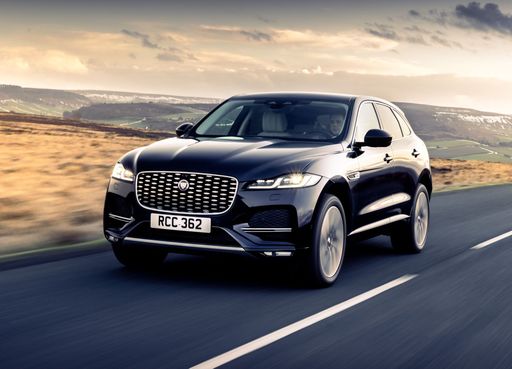
Jaguar F-Pace
Jaguar F-Pace
Jaguar F-Pace blends the prowling presence of a sports car with the practicality of an SUV, looking elegant while rewarding drivers with lively handling. If you crave something that feels special every time you climb in and prefer style and driving flair over blending into the parking lot, the F-Pace is a classy, slightly cheeky alternative to the usual German suspects.
details
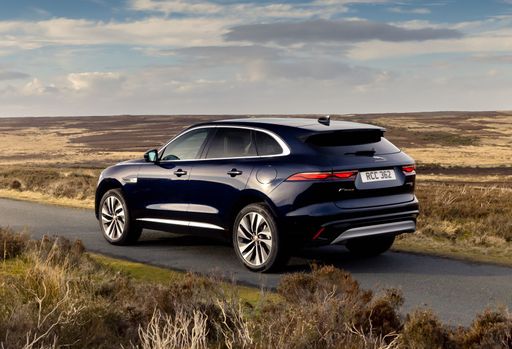
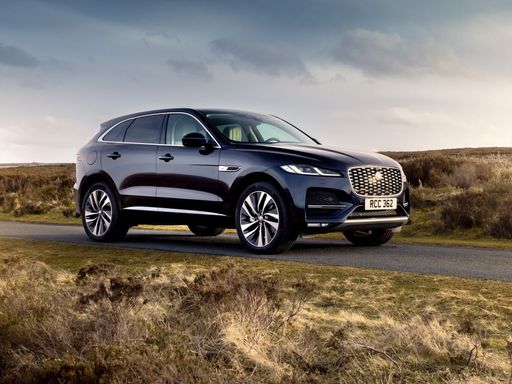
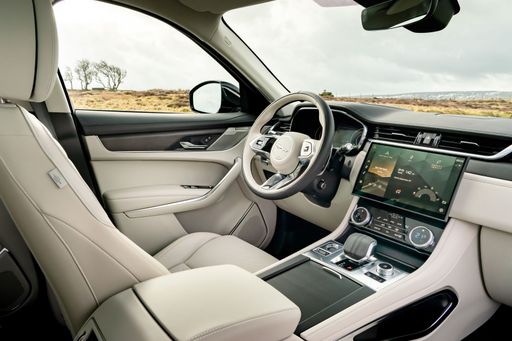
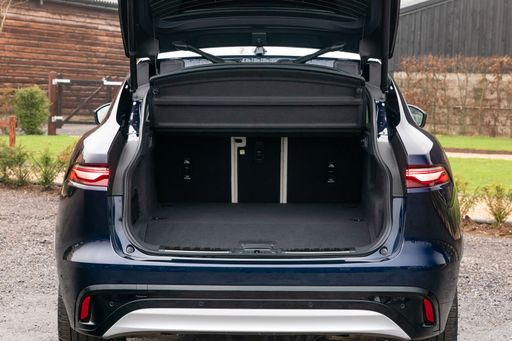
Land Rover Range Rover Velar
The Range Rover Velar marries sleek, pared-back styling with genuine off-road poise, so it looks at home in the city yet won’t flinch at rougher roads. Inside, a luxurious, tech-forward cabin pampers occupants while keeping the driving experience confidently in command — and yes, it somehow makes an SUV feel undeniably chic.
details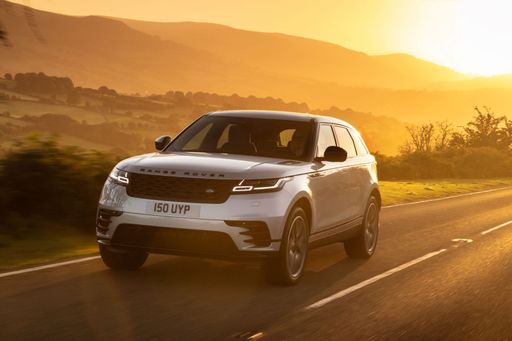
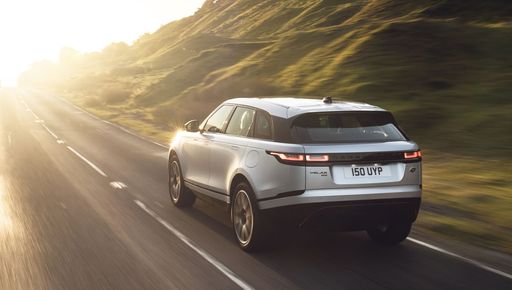
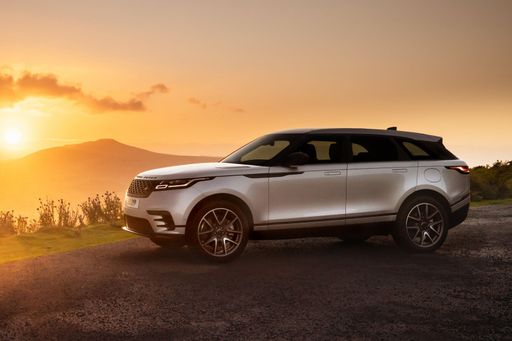
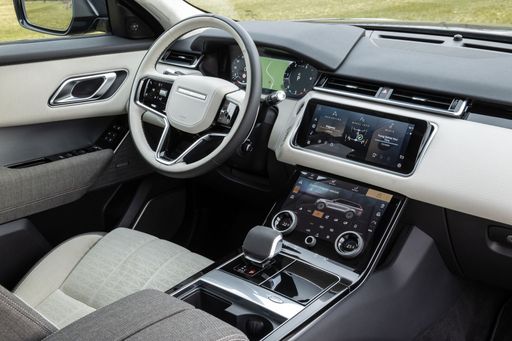
Costs and Consumption |
|
|---|---|
|
Price
56400 - 100800 £
|
Price
61900 - 87400 £
|
|
Consumption L/100km
1.8 - 12 L
|
Consumption L/100km
4.8 - 10.2 L
|
|
Consumption kWh/100km
-
|
Consumption kWh/100km
-
|
|
Electric Range
64 km
|
Electric Range
63 km
|
|
Battery Capacity
15.40 kWh
|
Battery Capacity
15.40 kWh
|
|
co2
41 - 274 g/km
|
co2
110 - 232 g/km
|
|
Fuel tank capacity
62 - 83 L
|
Fuel tank capacity
62 - 83 L
|
Dimensions and Body |
|
|---|---|
|
Body Type
SUV
|
Body Type
SUV
|
|
Seats
5
|
Seats
5
|
|
Doors
5
|
Doors
5
|
|
Curb weight
1951 - 2230 kg
|
Curb weight
2003 - 2280 kg
|
|
Trunk capacity
354 - 470 L
|
Trunk capacity
503 - 552 L
|
|
Length
4747 - 4762 mm
|
Length
4797 mm
|
|
Width
1936 mm
|
Width
1933 mm
|
|
Height
1664 - 1670 mm
|
Height
1657 - 1665 mm
|
|
Max trunk capacity
1299 - 1428 L
|
Max trunk capacity
1335 - 1358 L
|
|
Payload
457 - 589 kg
|
Payload
460 - 587 kg
|
Engine and Performance |
|
|---|---|
|
Engine Type
Diesel MHEV, Petrol MHEV, Plugin Hybrid, Petrol
|
Engine Type
Petrol MHEV, Plugin Hybrid, Diesel MHEV
|
|
Transmission
Automatic
|
Transmission
Automatic
|
|
Transmission Detail
Automatic Gearbox
|
Transmission Detail
Automatic Gearbox
|
|
Drive Type
All-Wheel Drive
|
Drive Type
All-Wheel Drive
|
|
Power HP
163 - 575 HP
|
Power HP
204 - 404 HP
|
|
Acceleration 0-100km/h
4 - 10.1 s
|
Acceleration 0-100km/h
5.4 - 8.3 s
|
|
Max Speed
195 - 286 km/h
|
Max Speed
209 - 250 km/h
|
|
Torque
380 - 700 Nm
|
Torque
430 - 650 Nm
|
|
Number of Cylinders
4 - 8
|
Number of Cylinders
4 - 6
|
|
Power kW
120 - 423 kW
|
Power kW
150 - 297 kW
|
|
Engine capacity
1997 - 5000 cm3
|
Engine capacity
1997 - 2997 cm3
|
General |
|
|---|---|
|
Model Year
2024
|
Model Year
2025
|
|
CO2 Efficiency Class
G, B
|
CO2 Efficiency Class
G, C
|
|
Brand
Jaguar
|
Brand
Land Rover
|
What drive types are available for the Jaguar F-Pace?
Available configurations include All-Wheel Drive.
